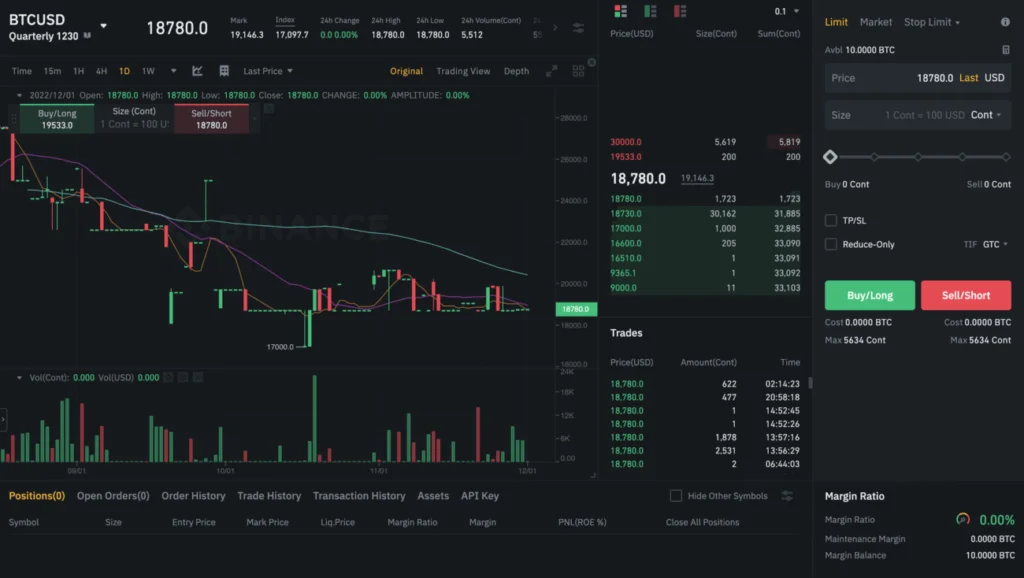Crypto futures trading is a type of derivative financial contract. It creates an obligation for the parties to exchange the crypto asset at a predetermined price and date. In this article, we look at what is crypto futures trading.
What is futures trading?
Futures are generally named based on the month they expire. For example, a March crude oil futures contract will expire in March and is based on crude oil as an underlying asset. You can also find contracts for other commodities.
Traders use the term futures broadly for a whole asset class. And there are multiple futures contracts available based on different types of assets. For example:
- Commodities such as crude oil, corn, and wheat;
- US bonds, or any other government-backed financial bond;
- Precious commodities like silver and gold; and
- Index futures such as the Dow Jones Industrial Index.
For example, a BTCUSD quarterly contract uses BTC as an underlying asset and expires quarterly.
What is crypto futures trading?
In crypto futures trading, traders can gain exposure to cryptocurrencies without actually needing to possess the underlying crypto asset. However, there are risks involved with futures trading such as high price volatility.
Traders use futures trading to take advantage and profit from market movements by going either long or short on a futures contract. Going “long” means that a trader purchases a futures contract expecting that it would increase in value in the future. On the other hand, a trader going “short” means they are hoping prices will drop.
Here is an example of a futures contract:
Adam enters into a long futures position when BTC was trading at US$15,000 whilst Bob enters into a short futures position. BTC prices rose to US$20,000 and both Adam and Bob agree to settle their positions. For Adam, BTC was worth more at settlement than when he entered the long position. So Adam makes a profit of US$5,000 from the exchange, being the price difference between the two times. On the other hand, Bob is holding a losing trade since he was holding a short position. So Bob must instead pay the exchange the deficit loss of US$5,000.

Difference between options and futures contracts trading
Futures and options contracts are not the same. An options contract does not impose an obligation on the buyer or the seller. Rather, an options contract gives the parties the option to buy or sell a crypto asset at a fixed price on a specified expiry date. There are 2 types of options contracts: call contracts which give traders the right to buy, and put options which give traders the right to sell.
On the other hand, in a futures contract, the buyer has to take possession of the underlying asset, and the seller has to sell that asset. The parties can settle for the cash equivalent, which is what happens on most cryptocurrency exchanges. However, the trade must take place.
Pros of crypto futures trading
Here are some benefits (pros) of crypto futures trading:
- Crypto futures contracts allow traders to gain exposure to cryptocurrencies and possibly profit from their price movements without holding the cryptocurrency itself.
- Traders can bet against the direction of the market and profit from it. Long traders predict the price of a crypto asset will increase. Whist traders which go short would profit if prices drop.
- Trading crypto futures with leverage allows traders to potentially have more gains with only a fraction of the total cost. This, however, comes with risks.
Cons of crypto futures trading
Here are some risks (cons) of crypto futures trading:
- Cryptocurrency markets can be very volatile. And unlike traditional markets, cryptocurrencies are traded 24 hours a day. This means traders must constantly check the direction of the market.
- Leveraged trading is very risky and could lead to substantial losses.
Conclusion
Crypto futures trading is a good way to gain exposure to cryptocurrency trading without holding the underlying cryptocurrency. It is also a hugely popular financial product that is offered on most crypto exchanges. Traders however should take extra care and ensure they have appropriate trading risk mitigation strategies in place to manage their portfolios. You would never invest more than you can afford to lose, especially when cryptocurrency markets are by nature extremely volatile.

Angela Wang
Angela loves cryptocurrency, technology that improves our lives...and food. Anything that merges these worlds together is even better.
